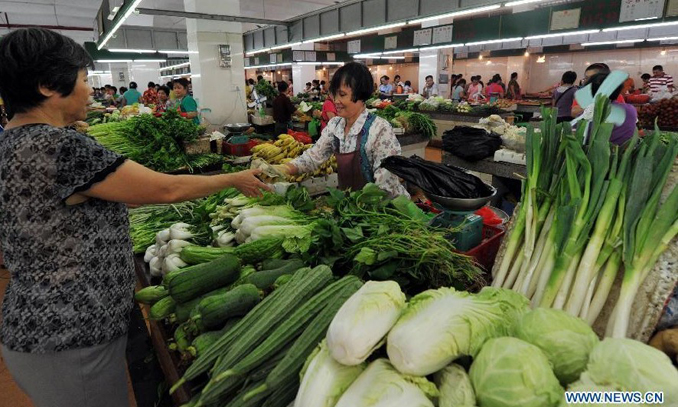Inflation at lowest point in 29 months

China's inflation dropped slightly more than expected to a 29-month low in June amid lackluster economic growth, prompting market expectations of more policy easing to stimulate growth in the world's second largest economy.
The consumer price index (CPI), a main gauge of inflation, fell to 2.2 percent in June from 3 percent in May, the National Bureau of Statistics said Monday in a statement posted on its website.
"The June reading was mainly driven by declining growth momentum in food inflation, which has the heaviest weighting out of the items in the CPI basket, as well as lingering effects from 2011," Wang Tao, managing director of China economic research at UBS Securities in Hong Kong, told the Global Times.
Food inflation went up 3.8 percent in June, compared to a 6.4 percent increase in May, according to the bureau.
The country's CPI growth has maintained a downward trend over the past three months, while the producer price index (PPI), a main gauge of inflation at the wholesale level, stayed in negative territory in June for a fourth month in a row, hitting a 32-month low.
"The downward trend in CPI growth will continue through the third quarter before hitting a low in October. The readings are to inch up over the last two months," Wang Yuwen, a researcher with Bank of Communications based in Shanghai, said in a research note sent to the Global Times.
It is taking a while for the government's pro-growth policies to be fully felt, therefore there would be little stimulus for price hikes, Wang wrote, predicting an obvious drop in the price level for the whole year, of "around 2.8 percent."
While falling inflation is strengthening market confidence that the government can easily meet the annual inflation target of 4 percent set in March, concerns have also arisen over weak economic growth and potential deflation risks as triggered by the falling figures.
The key Shanghai Composite Index stumped 2.37 percent to close at below 2,200 on Monday, after being affected by the June inflation reading.
"There may be one more rate slash in the third quarter as well as three cuts in the reserve requirement ratio (RRR), providing more room for the economic revival," Li Wei, a Shanghai-based China economist with Standard Chartered Bank (China), told the Global Times.
Lu Ting, China economist with Bank of America-Merrill Lynch, believes even stronger measures will be implemented.
"We expect two 25 basis points symmetric interest rate cuts and three 50 basis points RRR cuts before year-end," he said.
Economists generally remain confident that the economy will regain growth momentum, given the government's pro-growth efforts.
"We believe growth will rebound in the third quarter and increase to slightly below 9 percent by the fourth quarter," said Zhang Zhiwei, China economist at Nomura Securities in Hong Kong.
The second-quarter growth data is due to be published on Friday, with the market agreeing on assessments of a roughly 7.6 percent growth rate, the lowest level since the first quarter of 2009.
The government has already shown firm determination to inject vitality into growth, with the central bank announcing two rate cuts within one month.
Related report:
China's CPI slows to 29-month low